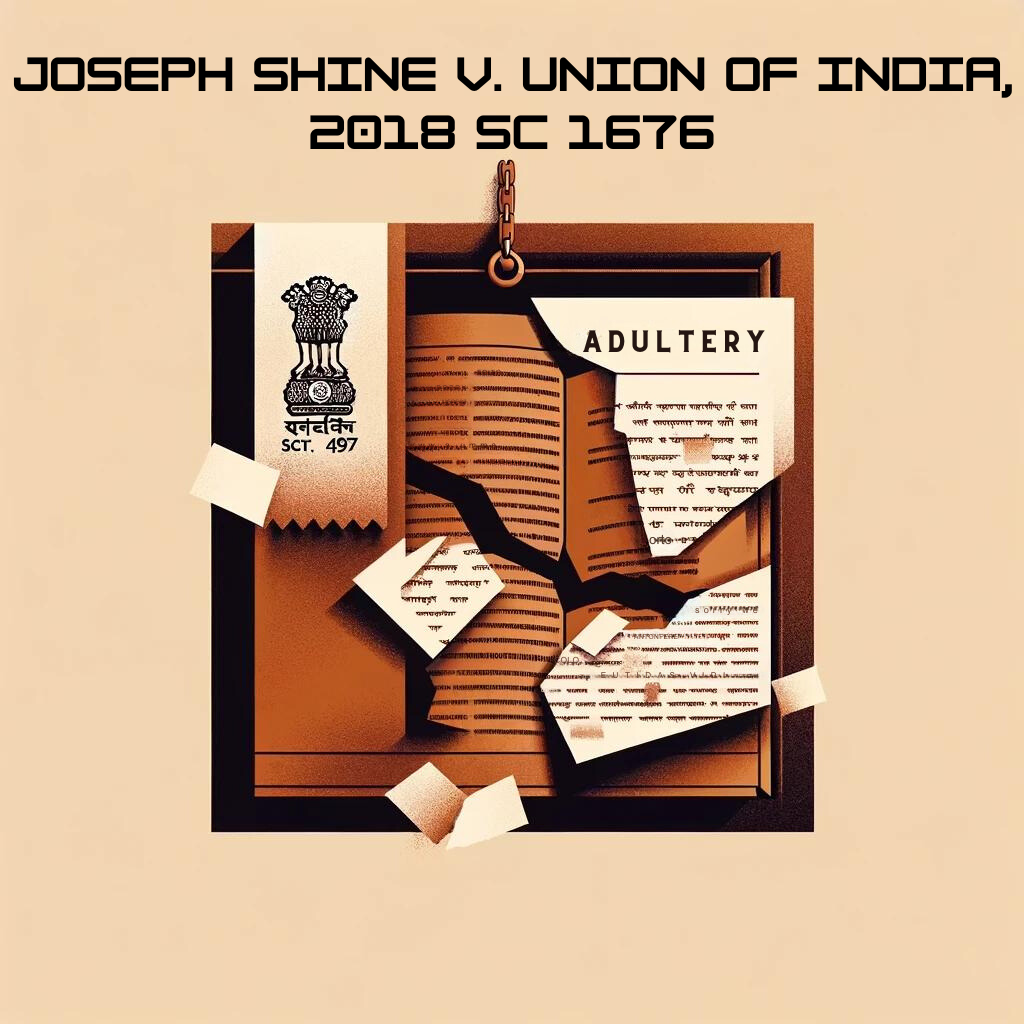In a groundbreaking decision, the Supreme Court of India delivered a judgment that would redefine the contours of matrimonial laws and gender equality in the country. The verdict on adultery case in question challenged the constitutionality of Section 497 of the Indian Penal Code (IPC), which criminalized adultery, arguing it was a violation of fundamental rights.
This judgment is a reflection of evolving legal and societal norms regarding marriage, gender equality, and personal liberty. It encourages critical thinking among judiciary aspirants on the balance between law, morality, and individual rights, making it a crucial case study for their preparation.

Facts
– Challenge to Constitutionality: This case brought into question the constitutional validity of Section 497 of the Indian Penal Code (IPC), 1860, which criminalized adultery. Moreover, Section 198 of the Code of Criminal Procedure (CrPC), 1973, positioned the husband as the aggrieved party in adultery cases.
– Discrimination and Gender Bias: It was argued that Section 497 of the IPC discriminates against women. Treating them as subordinates and violating the constitutional guarantees of equality (Article 14), non-discrimination (Article 15), and protection of life and personal liberty (Article 21).
– Unconstitutionality of Section 497 IPC: The Supreme Court found Section 497 to be unconstitutional. It was based on outdated gender stereotypes, treating women as the property of their husbands. Thereby denying them sexual autonomy and agency.
– Violation of Constitutional Morality and Equality: The court observed that the principles of constitutional morality, substantive equality, and the dignity of women were compromised by Section 497. It stressed that sexual autonomy is an essential aspect of identity.
– Rejection of Paternalistic Protection: The court criticized the notion of “protective discrimination” offered by Section 497 to married women as unconstitutional paternalism, which perpetuated subordination rather than addressing it.
– Decriminalization of Adultery: The verdict unanimously decriminalized adultery. Thus, highlighting that treating it as a criminal offense would mean unwarranted intrusion by the State into the private matrimonial sphere.
– Invalidation of Section 198(2) CrPC: Along with Section 497 IPC, Section 198(2) CrPC was also struck down as unconstitutional. It was violating the principle of substantive equality by treating the husband as the only aggrieved party in adultery cases.
Thus, this landmark judgment underscored the importance of gender equality, sexual autonomy, dignity, and privacy within the matrimonial relationship. Aligning with the constitutional ethos and promoting a progressive outlook towards personal laws in India.
Issues Involved
The heart of the case rests on two pivotal questions: Is Section 497 of the Indian Penal Code, which criminalizes adultery, constitutionally valid? Does Section 198(2) of the Code of Criminal Procedure, which positions the husband as the aggrieved party in adultery cases, stand the test of constitutional scrutiny? These questions are not just legal puzzles but reflect deeper societal values and the evolving understanding of gender equality and personal liberty.
Constitutional Validity of Section 497 IPC
The core issue revolved around the constitutional validity of Section 497 IPC. It questioned whether it unjustly discriminated against men and subjugated women. Thereby, they violate the fundamental rights enshrined in the Constitution of India.
Constitutional Validity of Section 198(2) CrPC
Similarly, the constitutional validity of Section 198(2) CrPC was under scrutiny. The provision’s approach is to treat the husband as the sole aggrieved party in adultery cases. It was challenged for being violative of the principles of equality and non-discrimination.
Observation
Section 497 IPC Held Unconstitutional
The Supreme Court observed that Section 497 IPC was unconstitutional. It was manifestly arbitrary and infringed upon Articles 14, 15, and 21. The court criticized the provision for perpetuating gender stereotypes and undermining the autonomy, dignity, and privacy of women. Thus, treat them as property rather than as equal partners in marriage.
Principles Justifying the Decision
The decision was grounded on principles of constitutional morality, substantive equality, and dignity. The court emphasized that sexual autonomy is an integral aspect of an individual’s identity and personality. These laws cannot treat married women as subordinate or devoid of agency.
Inappropriateness of Treating Adultery as a Criminal Offense
The judgment articulated that adultery should not be treated as a criminal offense. It argued that such a stance would entail undue State intrusion into the private domain of marital relationships. It is beyond the appropriate purview of legislative action.
Section 198(2) CrPC Held Unconstitutional
Similarly, Section 198(2) CrPC was found unconstitutional for violating the principle of substantive equality. By designating husbands as the only aggrieved party, it discriminated against women, undermining the notion of gender equality.
Overruling Previous Judgments
The Supreme Court decisively overruled its previous judgments on adultery, striking down Section 497 IPC and thereby decriminalizing adultery. This landmark decision marked a significant shift towards recognizing the nuances of personal autonomy and gender equality.
Read about Attempt to Cheat as well.
Conclusion
The Supreme Court’s verdict on decriminalizing adultery represents a monumental advancement in the evolution of gender jurisprudence in India. It reaffirms the judiciary’s commitment to upholding the constitutional values of equality, dignity, and personal liberty, setting a precedent for future cases on individual rights within the domain of marriage and beyond.
